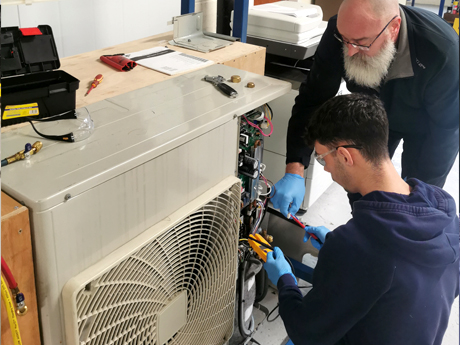Practical Refrigeration Training Centre
+44 (0) 1282 452152
Refrigeration, Air Conditioning and Electrical Training

Introduction
Evolving from the well established City and Guilds 6090 Trailblazer qualification which has been running for a number of years, this course is a ‘stand-alone’ level 2 course ideal for anyone not eligible for funding or who prefers to just take a level 2 qualification at this stage, always with the option of continuing to level 3 and the End Point Assessment at a later date if desired.
Aimed at both refrigeration and air-conditioning learners, no prior knowledge is required although because of the technical nature of the subject some GCSEs at grade 4 or C and above, or the equivalent, are strongly recommended.
Running over about 14 months in 12, one week sessions, from the start the emphasis is on ‘hands-on’ to ensure you have the practical skills so vital for this industry as well as the underpinning knowledge.
Industry recognised qualifications are also essential and with this in mind, included in the course as standard are the City and Guilds 2079 in Refrigerant Handling, the City and Guilds 6187 in Copper Brazing and the City and Guilds 6187 in Hydrocarbons.
The full cost of the course, including all registration fees, course notes and tuition fees is £6,300 plus vat and this can be spread over 6 equal instalments of £1,050 plus vat if preferred. Courses are running all year.
Objective
To obtain the following qualifications:
• City and Guilds 6090-20
• City and Guilds 2079 category 1
• City and Guilds 6187 Copper Brazing Level 2
• City and Guilds 6187 Hydrocarbon Refrigerant Handling
Methodology
Taking place in one week blocks the emphasis will be on ‘hands-on’ with practical work on real working systems as well as classroom study and the use of work benches. Assessment will be by means of:
• Written assignments
• Practical assignments
• Online, multiple choice question papers
• Work based evidence
Small numbers (no more than 10/11 per class) ensure plenty of one-to-one tuition and allow time for the practical elements to be completed.
Synopsis
The following topics will be covered (related to both refrigeration and air-conditioning equipment):
• Health and safety in the RACHP industry
• Fundamental principles, functions and features
• Vapour compression cycle
• System components
• Brazing Techniques
• Refrigerant handling (F Gas)
• Fault finding
• Leak testing
• Installation and commissioning
• Electrical systems
• Thermodynamics and system performance
• Hydrocarbons, A2L and flammable gases

 Practical Refrigeration Training Centre Limited
Practical Refrigeration Training Centre Limited